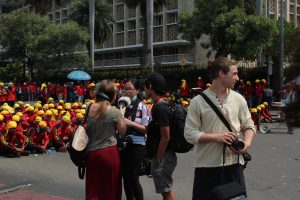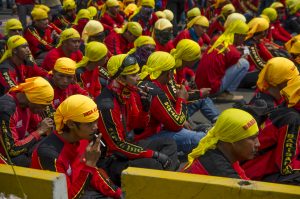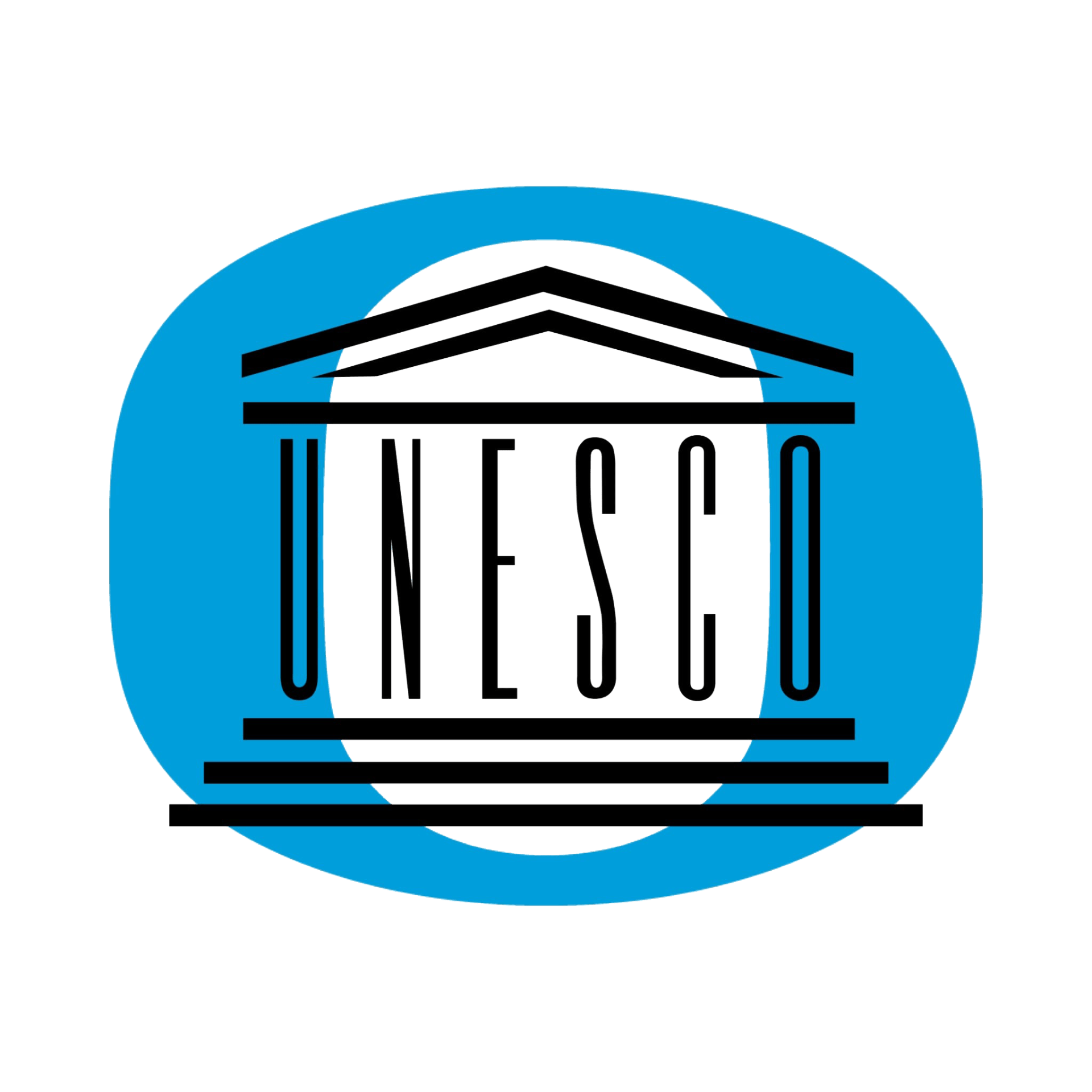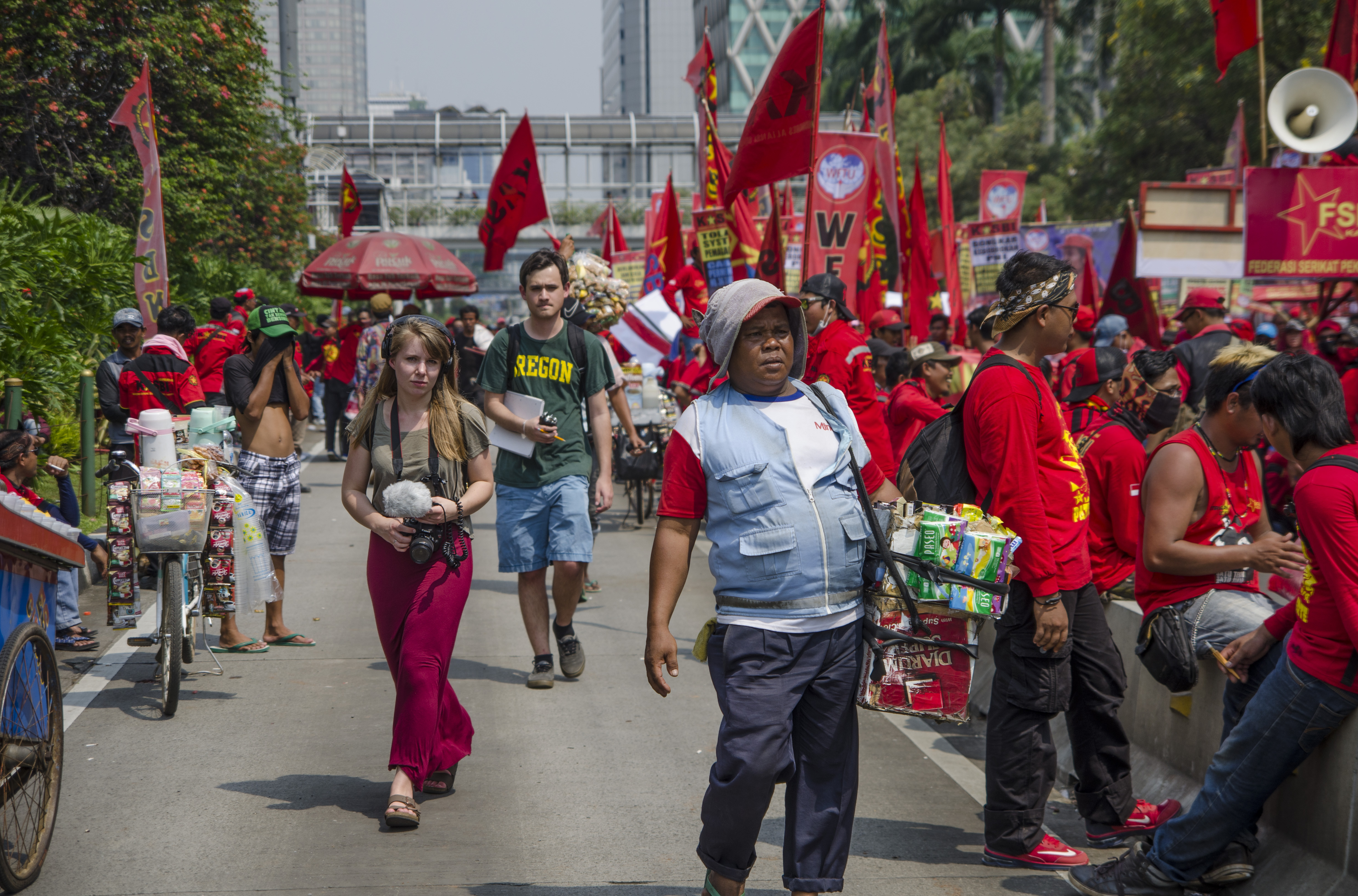Story by Levi Gittleman
After more than 20 hours of traveling and four airplane meals, I was ready for something sautéed from the street vendors of Jakarta, Indonesia.

Franziska Monahan interviews another journalist as Levi Gittleman looks for the next photo. (Photo by Charlie Craft.)
So our gang of six, which included some seriously talented journalism students — Andy Field, Emerson Malone, Nicole Bales, Charlie Craft, Franziska Monahan and myself — took a taxi to a nearby restaurant called Nasi Uduk Dan Ayam Goreng Lahap, which roughly translates to “delicious fried meat and rice.”
It was the night before the beginning of a conference where we would learn about the past, present and future of press freedom around the globe.
After the 30 minutes it took to drive around 3 miles, we pulled into a narrow alley and parked next to our restaurant. Sticking out like six University of Oregon students in the middle of a large city south of the Equator would, we sat down at the nearest table facing the street. It didn’t take long for us to realize that to order food, we just needed to walk up to the chef and ask for it, so I jumped up and began pointing and nodding at the various assortments of meat piled next to the chef. Getting to the restaurant was no easy task. We soon discovered that driving around in Indonesia was like navigating through a jam-packed maze with minimal traffic lights, traffic lanes or traffic rules in general. The constant call of the car horn served as a cautious reminder saying, “Hati-Hati” in Bahasa, or in English: “Look out, I’m about to run straight into you.”
“Chicken, good!” “Beef, good!” “Whatever that is that looks good, good!”
He cooked the meat right in front of me and piled it on a plate. We devoured the meat with rice wrapped in banana leaves and then stepped into the alley to walk around. The cars didn’t stop for us, so we quickly learned to stay to the side.
Everyone around us stared, and most smiled. The streets were coated with grease and piled with trash. Humidity hung in the air as if it were a broken steam room. Stepping over cobblestones and the occasional person passed out on a corner, we passed food carts and pop-up shops along with small apartments filled with families. All were curious and fairly friendly as we strangers stumbled through their close-knit community.
After walking for a while and feeling overwhelmed with the change in culture, we took a cab home and proceeded to sleep soundly despite the nonexistent silence of Jakarta.

May Day protesters smoke cigarettes and soak in the hot sun during a union sit-in. Approximately 30,000 workers attended the event on May 1, 2017. (Photo by Levi Gittleman.)
The next morning, the conference began. Journalists, free-press activists and others from the media industry sat in the convention center’s halls, where they would soon attend a variety of talks with topics ranging from how to handle fake news to diversity in the media. Esteemed guests spoke while other esteemed guests listened. Even the president and vice president of Indonesia showed up to talk about freedom of the press in their country, a topic that appeared controversial to many.
This event was the sixth World Press Freedom Day conference attended by UO students. The six of us, along with UO journalism professors Professor Peter Laufer, Assistant Professor Christopher Chávez and Professor Leslie Steeves, form the UO-UNESCO Crossings Institute, an organization focused on conflict-sensitive reporting and intercultural dialogue that was launched in 2013.
We spent our time interviewing, photographing and learning from the many journalists who had traveled from around the globe to attend the event, share stories and learn about the state of journalism in a global context.
This story is also published on the University of Oregon School of Journalism and Communication website here.



Thank you for the information about traveling which broadens your knowledge, here we will recommend the best travel news around the world, for further information please visit our website.https://medium.com/@kesyah437/
articles that tell about trips to various foreign countries which are certainly very exciting. you can visit the link. https://medium.com/@kesyah437/